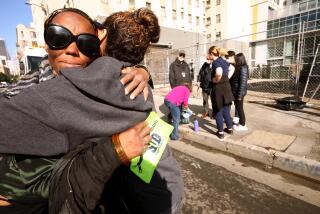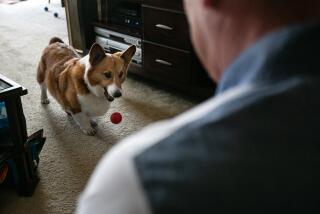Homeless inventor, generous doctor are pod-ners in helping others
SACRAMENTO — The smell of the blossoms had drawn Mike Williams to the rose garden sometime after midnight. Capitol Park security guards were scarce at that hour, and he hoped to get a little sleep.
At 60, the medical technology inventor and entrepreneur was homeless, his money gone, his 28-year marriage over.
But on that August night, things got worse: Williams was awakened by brutal kicks to his midsection. The thieves grabbed his backpack and laptop — which he’d been using to chronicle his unexpected journey.
When he was able, Williams stumbled two miles to an emergency room.
“My biggest fear was that I’d lose my faith,” Williams said recently. “But it took those guys who beat me up for me to meet Dr. Chen.”
A 72-year-old urologist with an easy laugh, Jong L. Chen later operated on the homeless man’s damaged prostate — treating him “with total respect and love,” Williams said.
Then Chen took a leap of faith.
Today, the two men are partners in a start-up venture that aims to use Williams’ street insights to help others. Compliments of Chen, Williams also now has a roof over his head.
When they shook on the partnership, Williams did not let go.
“Do you mind if I just hold your hand for a minute?” he asked Chen. “Because I don’t touch people anymore.”
::
Short and stout with thick sideburns and sparkling blue eyes, Williams is full of gratitude these days, tearing up easily when chronicling what he has lost — and gained.
But then, hardship notwithstanding, he has always been prone to optimism.
Williams grew up poor in a small pink trailer in Pollock Pines, Calif., and was on his own by the time he was 14, working two jobs while attending high school. He served in Vietnam, then made his way to the San Francisco Peninsula, where his entrepreneurial spirit took flight.
During a dental checkup, Williams asked Dr. Ronald Asti if he had a camera that would let him peer inside patients’ mouths. When the dentist said he didn’t, Williams replied: “I want to make one.”
The intra-oral camera he invented in the mid-1980s was “one of the best things to come around in dentistry,” said Asti, who was Williams’ business partner. “He was the leader.”
But those brilliant ideas didn’t necessarily translate into business success, Asti said.
Despite ample cash infusions from a local investor, their company did not reach profitability; in 1991 they sold to Canoga Park-based New Image Industries.
Five years later, Williams turned his next venture into the nation’s second-largest manufacturer of intra-oral dental cameras, with more than $13 million in annual sales. But rapid revenue growth was outpaced by marketing and other expenses, and New Image snatched that one up too.
Williams’ constant push to turn big ideas into bigger companies landed his family on a roller coaster of success and disappointment. At one point, they had to leave their plush Atherton, Calif., home — with its pool, tennis courts and horses — behind.
“There were a lot of ups and downs,” said his daughter, Morgan White, now 29.
Not long after, Williams founded another dental technology venture and moved his family to a 10-acre Pollock Pines horse property. Then came the biggest loss of his career: His partner in that venture wound up joining with other investors to edge him out.
Williams finally turned to contract work.
“Mike was always positive and came up with new angles to keep the project running,” recalled Yves Dossche, technology director for the Belgium-based firm Remedent, who spent several months with Williams working in Shenzhen, China, on his idea to use electro-luminescence to whiten teeth.
But the piecemeal work eventually dried up.
Caring for his aging in-laws, Williams fell deeper into debt. The bank foreclosed on the family’s home in 2009. The Williams’ marriage dissolved the next year.
“It took the fight out of me,” Williams said.
He loaded a few belongings into his 2004 Nissan: a psychedelic Einstein tie he had bought in Shenzhen; the mug from his granddaughter, Lillie, that bears her image and the words “I Love You Papa.” Then he drove off.
“I thought I’d find a job washing dishes and a place to live,” he said.
It didn’t happen.
Williams’ three grown children helped when they could. Fellow homeless people taught him to navigate the streets. He even persuaded a restaurateur to leave him 3 a.m. food drops.
And he begged — “just to get enough, $15 or $20, and then I would cry,” he said. “I would cry out of shame.”
His world was the green dumpster where he slept, the alley where he prayed, the sun-soaked rosebushes near the fountain where he eventually was beaten.
::
Williams woke up “as they were kicking me, just stomping me.” His Lillie mug was in a duffel bag that served as a pillow. That was safe.
He had a hernia and pneumonia, an emergency room doctor told him before referring him to the VA hospital. There, a caseworker landed him a precious bed at the Salvation Army shelter, where Williams learned that his prostate also had been torn.
Enter Chen, who had been practicing medicine in Sacramento for four decades while advocating for democracy and human rights in his native Taiwan. A generous political donor, he was willing to lend a hand to anyone in need.
“If you are down and you don’t have money, he’ll still look at you and take care of you,” said Dr. Joseph Lin, a longtime friend.
As Williams was about to undergo surgery, Chen heard him chatting with the operating room technician about the nanometer range on the laser. During a post-op visit, doctor and patient discussed Williams’ inventions — among them tiny cameras that peer into the heart and joints — and his latest big idea.
It had come to him while he was holed up in the dumpster. The lidded container, which Williams had lined with cardboard, had provided his only privacy. He envisioned a humane alternative: molded, durable survival pods that could be used for housing after disasters or to get the homeless off the streets.
It wasn’t long before Chen called Williams at the shelter and invited him to breakfast. During that meal at McDonald’s, the doctor said something that stunned Williams: “Let’s do it,” Chen said. The pod partnership was on.
Then they sat together, sipping coffee. “It was unbelievable solace and peace,” Williams said.
Chen said: “You can’t just take from society. You have to give back. I see lots of patients, from rich people to poor ones. I could see, ‘He’s OK.’ I believe in him.”
::
Chen helped Williams secure a small apartment; the doctor pays the $1,000 monthly rent. He also took Williams to Macy’s, picking out leather dress shoes and a charcoal-colored suit.
And although Chen never said a word about Williams’ scraggly beard, he did pinch it firmly one day between his thumb and forefinger — and tugged.
Message delivered.
Williams is now clean-shaven. He works out each morning at the apartment complex gym. He has an army of street friends; he made them turkey sandwiches on Thanksgiving, and soup and pasta salad at Christmas.
Each Thursday, the business partners meet to discuss their venture, Steps Housing Systems Inc. (Chen is chairman; Williams is chief executive.)
The 6-by-8-foot stackable pods, molded from poly-resin fiberglass, will come pre-assembled — with a chemical toilet, solar power capabilities, plexiglass doors and windows and battery-operated heaters and fans. A model complete with a cellphone charger, sleeping bag, water and enough nonperishable food to last 30 days will wholesale for about $4,500.
A manufacturer is in the process of pouring the prototypes, and Williams has reached out to the Federal Emergency Management Agency and private businesses to see if the pods would work for them. At least one has expressed interest in a camouflage model.
He envisions airport rentals for weary travelers. A portable pod “hotel” would provide homeless clients with meals, showers, laundry facilities and security. And Williams and Chen are forming a nonprofit so donors can sponsor pods for the needy.
Chen checks in with Williams regularly, calling and occasionally stopping by the apartment with lunch. “Sometimes people need help,” Chen said. “You feel better if you help.”
As for Williams, “I’ve never had a friendship like this,” he said. “My heart has changed.”
More to Read
Start your day right
Sign up for Essential California for news, features and recommendations from the L.A. Times and beyond in your inbox six days a week.
You may occasionally receive promotional content from the Los Angeles Times.







